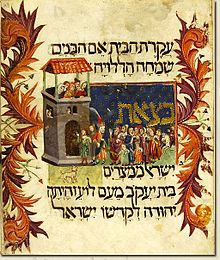Psalm 114

The 114th psalm is a psalm from the biblical book of psalms . In the Jewish liturgy it is part of the so-called Egyptian Hallel .
Text transmission
The handwritten tradition of Babylonian Judaism, which the Biblia Hebraica Stuttgartensia also follows, delimits the three Psalms 113, 114 and 115 from each other, just as the text is structured in modern Bible translations. The main stream of old manuscripts, on the other hand, treats Ps 114 and 115 as a unit and adds the concluding Hallelujah from Psalm 113: for example the Codex Leningradensis (Petropolitanus) and the Aleppo Codex . Among the old translations, for example, the Septuagint ( Codex Sinaiticus ), both Vulgate versions and the Syrian Peshitta offer this text classification. "It seems that the compilation of Ps 114 with Ps 115 was the classical Tiberian tradition." Although the tradition of drawing Psalm 114 and Psalm 115 together as a unit can be based on weighty witnesses, the unity of content of Psalm 114 suggests that that this combination was not original.
content
The poetic quality of Psalm 114 has been widely praised. Johann Gottfried Herder described it as "one of the most beautiful odes in all languages." The verdict of a classic psalm commentary is well known:
"The psalm stands out among its peers through fresh clarity, striking brevity, strict uniformity and beautiful symmetry."
Psalm 114 can be broken down as follows:
- Verses 1–2: Israel's origin story - the exodus from Egypt , the entry into the promised land .
- Verses 3-4: Reactions from the sea and Jordan , mountains and hills.
- Verses 5-6: Ask what the reason for these reactions is.
- Verses 7–8: Answer: Calling the earth to worship YHWH .
Individual aspects
In order to understand the whole Psalm, the interpretation of verse 4 is crucial. The verb r-ḳ-d (רקד) are often understood as a "tremor" of the mountains (ancient oriental theophany motif ); but that is not mandatory. Because in the Hebrew Bible the same verb also denotes the joyful dance of people and the hopping of animals, e.g. B. lambs, as an expression of joie de vivre.
From this comes the understanding of the fourth part. There are two similar verbs to choose from, which probably go back to the same root: ḥ-ṿ-l (חול) "turn, dance in a round dance" and ḥ-yl (חיל) "squirm, tremble." The Bible translations decide differently :
- “Tremble before the Lord, you earth, before the God of Jacob!” ( Luther Bible 2018, similar to Elberfeld and Zurich Bibles ). A communicative translation of the Bible , for example the Good News Bible , makes it clear what is meant here: "Yes, earth, tremble before the Lord, tremble when the God of Jacob shows himself!"
- “Dance before the face of the Lord, you earth, before the face of the God Jacob!” (Revised standard translation , similar to the Münsterschwarzach Psalter ).
The latter interpretation was particularly represented in German-speaking countries by Norbert Lohfink ( Das tanzende Land , 1994). The conclusion of Psalm 114 evokes the following picture: Just as victorious kings were received with round dances and drums on their return from the fight, the whole earth should worship YHWH, the God worshiped on Zion.
literature
- Frank-Lothar Hossfeld , Erich Zenger : Psalms 101–150 (Herder's Theological Commentary on the Old Testament). Herder, Freiburg / Basel / Vienna 2008. ISBN 978-3-451-26827-4 .
Web links
- Psalm 114 in the standard translation , the Luther Bible and other translations from bibleserver.com
- Psalm 114 in the Biblia Hebraica Stuttgartensia (BHS) on bibelwissenschaft.de
- Sheet music in the public domain for settings of Psalm 114 in the Choral Public Domain Library - ChoralWiki (English)
Individual evidence
- ↑ Frank-Lothar Hossfeld, Erich Zenger: Psalms 101-150 , Freiburg et al. 2008, p. 258. A third ancient text division is weakly attested, which counts Psalm 114 with Psalm 115, 1–3 as one psalm and the rest of Psalm 115 as a further psalm.
- ↑ Johann Gottfried Herder: From the spirit of Ebrean poetry , 2nd part, Leipzig 1787, p. 84.
- ↑ Hermann Gunkel: The Psalms. Vandenhoeck & Ruprecht, 6th ed. Göttingen 1986, p. 495.
- ↑ Frank-Lothar Hossfeld, Erich Zenger: Psalms 101-150 , Freiburg et al. 2008, p. 264.
- ↑ Frank-Lothar Hossfeld, Erich Zenger: Psalms 101-150 , Freiburg et al. 2008, p. 269.
- ↑ Frank-Lothar Hossfeld, Erich Zenger: Psalms 101-150 , Freiburg et al. 2008, pp. 270-272.
